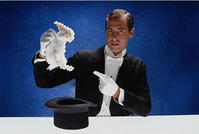| Monday, November 7, 2011 |
| Notice the incidental |
 If you want to know the truth, don't look where the magician leads you to look. If you want to know what a company really is doing, don't look in their annual report or in their press releases. If you want to know what a politician is about, his speeches might not be the place to start. If you want to know the truth, don't look where the magician leads you to look. If you want to know what a company really is doing, don't look in their annual report or in their press releases. If you want to know what a politician is about, his speeches might not be the place to start.
The traces that people leave behind tell you something about what they've been doing and what they're like. Less so, the selective and screened and carefully prepared presentations they make. More so, the unnoticed tracks they leave when they go about their business and when they maybe don't know that anybody is watching. If we're talking about an individual, their unconscious body language might reveal things, even when they're giving a prepared presentation. What they do once the camera is off will tell you something about who they are. What would tell you a lot more would be how they are privately. If it is a person you personally are going to do something together with, it would be very worthwhile to get to know them in a variety of situations. How are they when they're tired and frustrated? How is it to have a disagreement with them? What do they spend their time doing when nobody's watching? If you don't know them personally, it would still tell you a lot about them to catch them in any kind of unguarded moment. Or to examine what is going around them. How are the people they're close to. How are the activities they've been involved in. You don't really know people, and you can't trust them, if you only go by their prepared materials, their CV, their speeches, their commercials, their promises, their self-definitions. The same for organizations. The picture they're presenting to you is most likely what they would like to present to you, not what they really are. Some organizations employ a lot of people who's main job it is to make it look much better than what it is and to hide what really is going on. They work in PR, Marketing, Legal, Community Relations, Customer Service, etc. The people who work there might have a more noble idea of what they're there for, but that's very often what it adds up to. So, don't expect to get truth that way. Expect to get a decoy. You can't necessarily expect to get better information from people or organizations who are stated opponents of whoever you're looking at. They will also mainly give you prepared packages of information designed to tell you what they want to tell you. It isn't just that people are crooks who want to mislead everybody. Most people aren't crooks. But our society favors quite one-dimensional versions of everything. There are great economic and political advantages in presenting very clean, simple, straightforward pictures of what one is and what one does. But the realities of life are a lot more multi-dimensional, complex, fuzzy, ambiguous, facetted. The truth has its own beauty, but it isn't guaranteed to be neat and pretty and coherent and politically correct and easily embedded in a soundbite. So it is usually hidden, and a lot of effort is expended in denying its existence. Nobody can control all information about themselves, other than in relation to people who don't take time to pay attention and look for themselves. But that's most people. It is just a matter of habit, though. Even if you don't have time to analyze something in depth, to find what's up and down to it, you can at least think a bit critically about it, and notice the incidental details that are out of sight. If you're being asked to look at something, it will often serve you better to look elsewhere. Ref: Incidental Data Analysis [ Patterns | 2011-11-07 17:22 | 4 comments | PermaLink ] More > |